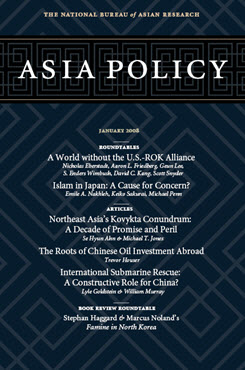What If? A World without the U.S.-ROK Alliance
In this roundtable, Asia Policy presents three papers on various aspects of “a world without a U.S.-ROK alliance.”
Free through December 5, 2016.
Introduction
Nicholas Eberstadt, Aaron L. Friedberg & Geun Lee
A Parable: The U.S.-ROK Security Relationship Breaks Down
S. Enders Wimbush
This essay outlines the different forces and influences that might prevail in Asia if the U.S.-ROK security relationship were to end.
Inter-Korean Relations in the Absence of a U.S.-ROK Alliance
David C. Kang
This essay focuses on preferences of the South Korean public and elite regarding how best to deal with North Korea, whether North Korea might pull back on its hesitant moves toward economic reform and a more open diplomacy, and how Chinese foreign policy toward the Korean Peninsula might evolve.
U.S.-ROK Civil Society Ties: Dynamics And Prospects in a Post-Alliance World
Scott Snyder
This essay examines the relationship between the U.S.-ROK security alliance and the civil society ties linking the United States and South Korea and analyzes the likely impact on such ties in the event of the termination of the security alliance.
About Asia Policy
Asia Policy is a peer-reviewed scholarly journal presenting policy-relevant academic research on the Asia-Pacific that draws clear and concise conclusions useful to today’s policymakers. Asia Policy is published quarterly in January, April, July, and October and accepts submissions on a rolling basis. Learn more


